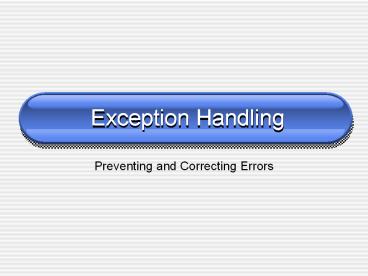Exception Handling - PowerPoint PPT Presentation
Title:
Exception Handling
Description:
Blanca Polo. 2. Exceptions ... Blanca Polo. 6. Dealing With Exceptions. A program can deal with an exception in one of three ways: ... – PowerPoint PPT presentation
Number of Views:44
Avg rating:3.0/5.0
Title: Exception Handling
1
Exception Handling
- Preventing and Correcting Errors
2
Exceptions
- An exception is an object that describes an
unusual or erroneous situation - Exceptions are thrown by a program, and may be
caught and handled by another part of the program
3
Exceptions
- A program can be separated into a normal
execution flow and an exception execution flow
Execution
Exception
4
Error Vs Exception
- An error is also represented as an object in
Java, but usually represents a unrecoverable
situation and should not be caught
5
Predefined Exceptions
- Java has a predefined set of exceptions and
errors that can occur during execution
NumberFormatException InputMismatchException Index
OutOfBoundsException NullPointerException
6
Dealing With Exceptions
- A program can deal with an exception in one of
three ways - ignore it
- handle it where it occurs
- handle it an another place in the program
Maybe with exceptions that we create
Java predefined exceptions
7
Dealing With Exceptions
- We are actually dealing with it in our program,
not in th original JAVA program that is throwing
the exception.
Java predefined exceptions
Exception in thread "main" java.util.InputMismatch
Exception at java.util.Scanner.throwFor(Sc
anner.java818) at java.util.Scanner.next(
Scanner.java1420) at java.util.Scanner.ne
xtInt(Scanner.java2029) at
java.util.Scanner.nextInt(Scanner.java1989)
at ReadWScanner.main(ReadWScanner.java17)
The manner in which an exception is processed is
an important design consideration
8
Ignored Exception
- If an exception is ignored by the program, the
program will terminate abnormally and produce an
appropriate message
- The message includes a call stack trace that
- indicates the line on which the exception
occurred - shows the method call trail that lead to the
attempted execution of the offending line
Exception in thread "main" java.util.InputMismatch
Exception at java.util.Scanner.throwFor(Sc
anner.java818) at java.util.Scanner.next(
Scanner.java1420) at java.util.Scanner.ne
xtInt(Scanner.java2029) at
java.util.Scanner.nextInt(Scanner.java1989)
at ReadWScanner.main(ReadWScanner.java17)
java/ReadInput/oldInput/Parse1.java java/ReadInput
/oldInput/Parse2.java java/ReadInput/oldInput/Read
Num.java java5/TempConverter.java
9
The try Statement
- To handle an exception in a program, the line
that throws the exception is executed within a
try block - A try block is followed by one or more catch
clauses
try //risky code goes here catch(Exceptio
nType and name) //preventive measures
10
The finally Clause
- A try statement can have an optional clause
following the catch clauses, designated by the
reserved word finally
try //risky code goes here catch(Exception
Type and name) //preventive
measures finally //to be executed
regardless of try outcome
11
Finally executes
- The statements in the finally clause always are
executed - If no exception is generated, the statements in
the finally clause are executed after the
statements in the try block complete - If an exception is generated, the statements in
the finally clause are executed after the
statements in the appropriate catch clause
complete
12
Exception Propagation
- Exceptions propagate up through the method
calling hierarchy until they are caught and
handled or until they reach the level of the main
method - A try block that contains a call to a method in
which an exception is thrown can be used to catch
that exception
Exception in thread "main" java.util.InputMismatch
Exception at java.util.Scanner.throwFor(Sc
anner.java818) at java.util.Scanner.next(
Scanner.java1420) at java.util.Scanner.ne
xtInt(Scanner.java2029) at
java.util.Scanner.nextInt(Scanner.java1989)
at ReadWScanner.main(ReadWScanner.java17)
13
Your Own Exceptions
- A programmer can define an exception by extending
the Exception class or one of its descendants - The parent class used depends on how the new
exception will be used
We will come back to this later on in the
course
14
Checked Exceptions
- An exception is either checked or unchecked
- A checked exception either
- must be caught by a method, or
- must be listed in the throws clause of any method
that may throw or propagate it.
15
Checked Exceptions
- A throws clause is appended to the method header
- The compiler will issue an error if a checked
exception is not caught or asserted in a throws
clause
Public class MyClass public static void
main(String arg ) throws Exception
//code
16
Unchecked Exceptions
- An unchecked exception does not require explicit
handling, though it could be processed that way - The only unchecked exceptions in Java are objects
of type RuntimeException or any of its
descendants - Errors are similar to RuntimeException and its
descendants in that - Errors should not be caught
- Errors do not require a throws clause
17
Questions?
Exception
try catch finally
java/ReadInput/oldInput/ParseI.java java/ReadInput
/oldInput/ParseD.java java/ReadInput/oldInput/Read
Num3.java Java5/Add.java































